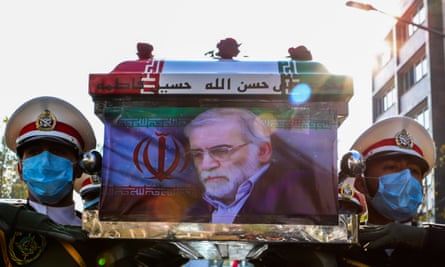
Iranian MPs seek to harden nuclear stance after killing of scientist
Posted: 2nd December 2020
From the Guardian
Foreign ministry disavows bill passed by parliament demanding rise in uranium enrichment

Soldiers carry the coffin of the Iranian nuclear scientist Mohsen Fakhrizadeh during his funeral in Tehran.Photograph: Iranian Defence Ministry Office/Zuma Wire/Rex/Shutterstock
The Iranian foreign ministry has been forced to disown a bill passed by the country’s parliament requiring the government to step up uranium enrichment closer to the level needed for a nuclear weapon in retaliation for the assassination of a top nuclear scientist.
The bill also included a provision requiring the government to suspend UN nuclear inspections if western powers that are still part of the 2015 nuclear accords, as well as China and Russia, do not re-establish Iran’s access to world banking and oil markets within a month.
The foreign ministry said parliament did not have the powers to direct negotiations on the future of the Iran nuclear deal, saying this was the prerogative of the supreme national security council and not elected MPs.
Saeed Khatibzadeh, Iran’s foreign ministry spokesman, said the ministry had not been consulted about the resolution, and described it as neither necessary or useful.
The government spokesman, Ali Rabiei, told reporters: “The government believes that, under the constitution, the nuclear accord and the nuclear programme … are under the jurisdiction of the supreme national security council … and parliament cannot deal with this by itself.”
Parliament has often demanded a hardening of Iran’s position on the nuclear issue in recent years, without much success. The government must weigh any response to Friday’s killing of the nuclear scientist Mohsen Fakhrizadehagainst potentially risking improved ties with the US once Joe Biden takes over as president.
In a warning shot to Iran, the director of the UN’s International Atomic Energy Agency, Rafael Grossi, said: “It is very important to give the necessary and credible assurances to the world that there will be no deviation from the nuclear programme to military goals.”
There have been a number of conflicting accounts of the attack on Fakhrizadeh, which Iran has blamed on Israel. Israeli officials have declined to comment on the killing and no one has claimed responsibility.
Western intelligence sources voiced scepticism about a theory advanced by the secretary of Iran’s supreme national security council on Monday that Fakhrizadeh was killed solely by a remote-controlled device.
“The operation was very complex and took place using electronic devices, and no one was present at the scene,” Ali Shamkhani told Iranian media at Fakhrizadeh’s funeral.
But sources said an attack plot of such political sensitivity would require “eyes on” active surveillance – and those carrying it out would want to be sure they had achieved their goal, which would typically require a presence on the ground of some kind.
The idea of a remote plot could have advantages for Tehran, they added, because it would not require Iran to engage in a high-profile hunt for the killers in the run-up to Biden’s inauguration, even if it made the deadly plot look sophisticated as a result. That could help manage public opinion in Iran and temper pressure for an immediate response.
A close friend of Fakhrizadeh’s wife said on Monday that the couple were driving in their own car, with their bodyguards in a separate vehicle, at the time of the attack.
Shohreh Pirani, herself the widow of an assassinated nuclear scientist, said that after an explosion in a car parked by the side of the road, Fakhrizadeh opened the door and got out of his car. As he reached the car of his bodyguards, two bullets hit him in the shoulder, Pirani said. His wife – who survived the attack – was standing close to him. Pirani said after Fakhrizadeh was injured, the bodyguards threw themselves at him but he was shot four times.
A separate account published by Javad Mogoei, a documentary film-maker living in Iran, suggested 12 people were present during the attack, four of whom were on motorbikes. Mogoei said Fakhrizadeh had two escort cars but that his own vehicle was not bulletproof.
According to this account, after the initial shootings a Nissan pickup truck exploded and then Fakhrizadeh and his bodyguards were shot again, with Fakhrizadeh dying in hospital.